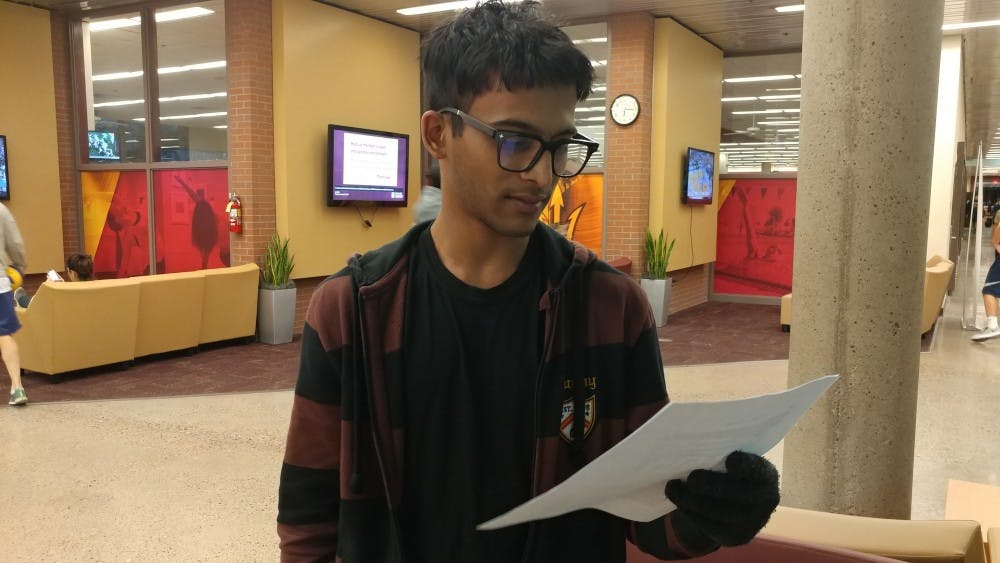When ASU decided to exempt on-campus workers from Proposition 206, or the Arizona Minimum Wage and Paid Time Off Initiative, they also exempted the international students who usually only work on-campus jobs.
Due to regulations placed on international students, they are left with fewer options to get an off-campus job, leaving them without an opportunity to find higher paying work.
Sachin Shivakumar, a graduate student studying mechanical engineering, is from India. He works as a tutor for the Ira A. Fulton School of Engineering, teaching undergraduate students in entry-level mechanical engineering classes.
“Since we grad students just have nine credits per semester, I do have a lot of free time,” Shivakumar said. “It’s one way to fill up your time and be engaged. It also makes living a little more convenient because you have a source of income.”
He said international students are not allowed to take off-campus jobs because their student visas do not permit it. Shivakumar makes minimum wage at his tutoring job, spending his wages mostly on food.
He said it would be really helpful to earn two more dollars per hour.
“Because if everyone else is getting paid above $10, I don’t know why ASU is exempt from that, but especially for students it would really make a difference, I suppose, over time,” Shivakumar said.
If international students wish to keep working at their on-campus jobs, they cannot work over 20 hours per week and must maintain valid immigration documents and immigration status.
International students must enroll full-time for the current semester. If they want to work summer or winter break, they have to have been enrolled full-time the semester prior.
Prashaanth Baskar, a graduate student studying structural engineering, is also from India. He works as a grader at ASU's Julie Ann Wrigley Global Institute of Sutainability, correcting assignments and quizzes for his professor.
Baskar said he wants to have some source of income.
“I need some money for tuition, fees, so I thought I’d get an on-campus job,” Baskar said.
Baskar said making $10 an hour at his job would benefit him, as it would help him with pay for school.
“That’s two whole dollars, so that’s like a lot when you’re working 20 hours a week,” Baskar said. “That’s 40 extra dollars per week, so that’s like a lot of money.”
Daniel Hoyle, ASU's associate director of the International Students and Scholars Center, focuses on making sure international students understand the rules associated with being an international student.
“Through their status as an international student, they are offered two opportunities to work off-campus,” Hoyle said.
Hoyle said the two opportunities were CPT, Curricular Practical Training, and OPT, Optional Practical Training.
CPT is an academic internship related to the student’s major and is offered before graduation. For an OPT, the international student would stay for an additional year for the internship.
“Most of it’s on campus employment until they hit those two opportunities,” Hoyle said. “That’s what we’re here for, to help them understand that because we want them to make the most of their time here at ASU both studying and working.”
Kevin Calabrese, a non-international student who is very passionate about how international students have been affected by prop 206, said he did not think the student visas allow international students to work anywhere off-campus.
“It’s a way longer process to obtaining a work visa if you can imagine,” Calabrese said. “So pretty much, those who want to come here as international students to study here don’t apply for a work visa.”
Calabrese said international students typically apply for the student visa and just work on-campus. He said usually people would think that if ASU is paying below minimum wage, then nobody will want to work at an on-campus job.
“That would give ASU no choice but to raise their own minimum wage to what it is set at other workplaces, but the problem with that is that’s not really a problem for ASU because they have international students who are willing to take those positions,” Calabrese said.
Calabrese said he thinks it is unfair to international students, despite him being against the original minimum wage increase in the first place.
“I think that now that it has been put in place, ASU needs to set their minimum wage at the same level as private businesses in the state."
Reach the reporter at anbuechl@asu.edu or follow @alexa_buechler on Twitter.
Like The State Press on Facebook and follow @statepress on Twitter.




